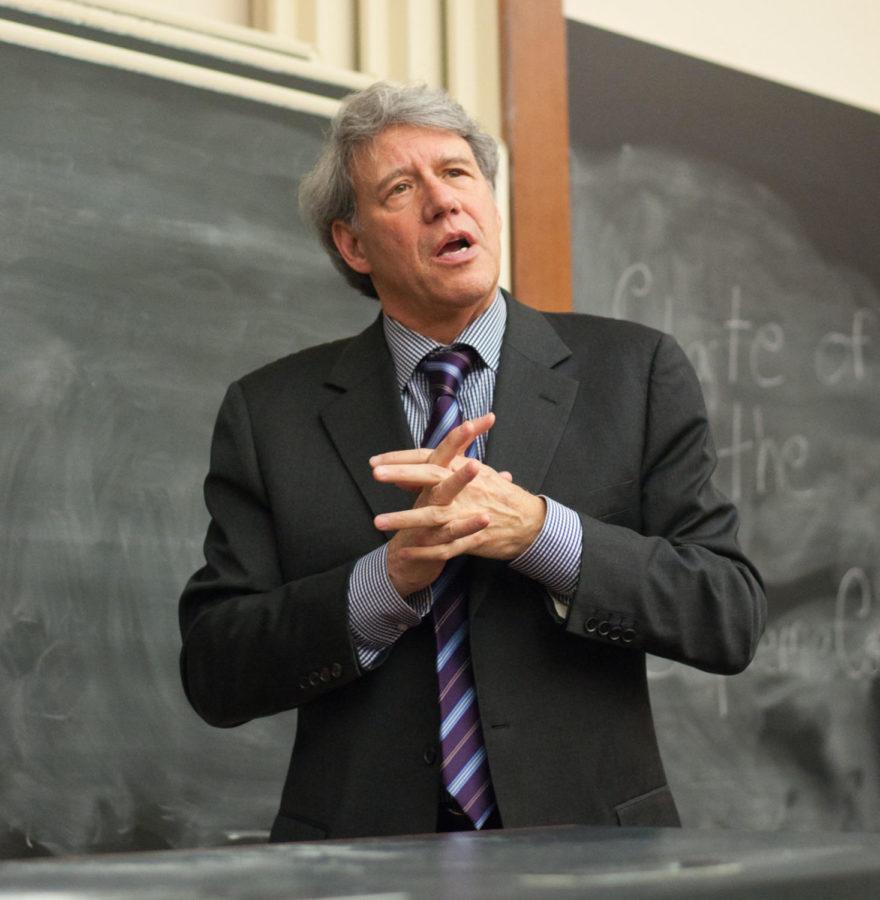Law Professor Geoffrey Stone gave the annual “State of the Supreme Court” talk presented by the College’s chapter of the American Civil Liberties Union (ACLU) in Stuart Hall yesterday.
Stone began by discussing the last term’s most important decisions, including what he considers the only substantial one—the Court’s affirmation of the Affordable Care Act. In terms of legal precedent, he said, the importance of this case was Chief Justice John Roberts’s deciding vote based on Congress’s power to tax instead of the Commerce Clause, which the Obama administration evoked to defend the act.
Another decision Stone discussed was Hosanna–Tabor Evangelical Lutheran Church and School v. Equal Employment Opportunity Commission, which ruled that federal discrimination laws do not apply to religious organizations’ and parochial schools’ selection of religious leaders, including teachers. Stone explained that the Court’s decision was based on what it considers to be the large ministerial reach of teachers.
According to Stone, the current term “has the potential to be a much bigger deal.” He believes three upcoming cases, regarding voting practices, affirmative action, and same-sex marriage may be particularly consequential.
The Court’s plan to revisit the Voting Rights Act of 1965, which established federal oversight of voting practices in states which historically disenfranchised voters on racial grounds, will determine whether the act is obsolete or still necessary.
Stone believes differing interpretations of the Equal Protection Clause will play a significant role in the affirmative action case Fisher v. University of Texas and a case involving gay marriage.
Stone sat down with the Maroon after the event to talk about predicting the Court’s decisions, his opinion on recent rulings, and the Court’s responsibility to guide lawmakers.
Chicago Maroon: How often do you think the ruling of these cases can be predicted?
Geoffrey Stone: The kind of cases we’re talking about here, they’re generally pretty highly ideological cases where the justices have very different approaches to the interpretation of [the] Constitution. If you know what kind of approaches they are, you can reasonably predict…how they will approach the question. Say, on the same sex marriage issue, the reason I was able to say—whether rightly or not—that we know where eight of the justices are likely to come out, is basically because, given everything else they’ve written or said in their opinions, the Justices like Scalia, Roberts, Thomas, and Alito are going to see the claim of gays as a class that is entitled to special scrutiny and the Equal Protection Clause as unpersuasive.
CM: Were there any cases last term when you strongly disagreed with the ruling?
GS: No. Some were decided on narrow grounds, so they could have done it more boldly, in my view. I guess the one I disagree with—not strongly, but I disagree with—was the [Hosanna] case, the religious exemption case, where I think they went too far in granting the exemption relative to people who are religious officials rather than just employees or teachers. But it’s reasonable, and the liberal justices all agreed with the conservative justices.
CM: How do you think the Equal Protection Clause should be interpreted: in terms of protecting specifically African-Americans or all races?
GS: I think affirmative action programs are constitutional, for two reasons. I think it’s correct to say the primary purpose of the Equal Protection Clause is to protect groups that have been historically oppressed. You can’t ignore laws that discriminate whites because any law that takes race into account has the effect of reinforcing racial thinking…. I think that at its core, the clause is about protecting discrete minorities. The second reason that I think affirmative action is permissible is that the state interest in doing it is sufficiently great to justify allowing it, where the group that’s being benefited are those that have traditionally been discriminated against.
CM: From the cases you talked about, it seems that it is very common for a court to avoid making controversial decisions. How common is this phenomenon?
GS: They can do it if they want to by just either evading the issue, or either finding a narrow way to avoid the question, or do it very incrementally…. The problem with that approach is that you’re not making any law. There’s only one Supreme Court and there’s 50 state legislatures and they need guidance so they know whether what they’re doing is going to be permissible or not…. A part of the genuine responsibility of judges is to use your authority in a way that is effective, so people know what their rights are and what they can and can’t do.








